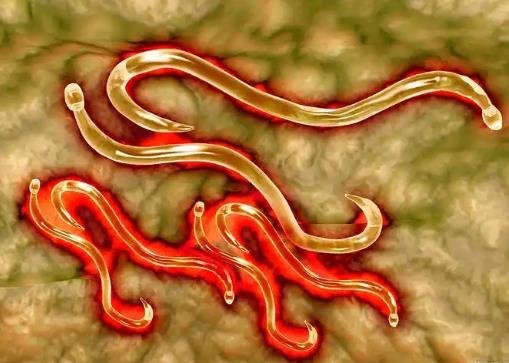There’s roundworms, which I think are pretty common, especially in puppies. They look like spaghetti, right? Then there are tapeworms, which I’ve heard are segmented and can be seen in the dog’s poop or around their rear. They might get these from fleas, maybe?
Hookworms come to mind too. They’re supposed to be smaller and can cause anemia because they feed on blood. I think they can be transmitted through the environment, like soil, or even from the mother’s milk. Whipworms are another type; they live in the large intestine and their eggs are really resilient in the environment. Symptoms might include diarrhea and weight loss.
Heartworms are serious, but they’re not intestinal, right? They affect the heart and lungs, transmitted by mosquitoes. But the user asked for intestinal parasites, so maybe heartworms aren’t included here. Still, I should double-check that. Then there’s Giardia, which is a protozoan parasite causing diarrhea. It’s not a worm, but it’s an intestinal parasite. Coccidia is another protozoan, maybe causes similar issues.
Oh, and maybe something like Strongyloides? I’m not sure if that’s common in dogs. Also, the user might be interested in how these parasites are transmitted, symptoms, and treatment. Let me think about each one:
Roundworms: Transmission via mother’s milk, placenta, or infected environment. Symptoms like pot-bellied appearance, vomiting, diarrhea. Treatment with dewormers like pyrantel pamoate.
Tapeworms: Fleas are intermediate hosts, so dogs get them by ingesting fleas. Segments look like rice grains. Treated with praziquantel.
Hookworms: Larvae penetrate skin or ingested. Cause anemia, dark stools. Treatment with fenbendazole or pyrantel.
Whipworms: Ingested eggs from soil. Symptoms intermittent diarrhea, weight loss. Fenbendazole or other specific meds.
Heartworms: Not intestinal, but important to mention if user is confused. Maybe note that.
Giardia: Waterborne, causes diarrhea. Treated with fenbendazole and metronidazole.
Coccidia: Protozoan, treated with sulfa drugs.

Prevention: Regular deworming, flea control, clean environment, fecal exams.
Wait, did I miss any? Maybe Toxocara canis and Toxascaris leonina for roundworms. Also, the different species of tapeworms like Dipylidium caninum (from fleas) and Taenia species (from prey animals).
Also, Strongyloides stercoralis, which are threadworms. They can penetrate the skin, similar to hookworms. Maybe less common but still possible.
For symptoms, it’s important to note that some parasites can be asymptomatic in mild cases but severe in heavy infestations. Also, some can be zoonotic, like roundworms and hookworms, which can infect humans, especially children.
So to organize, list each parasite, type (nematode, cestode, protozoan), transmission, symptoms, treatment, and prevention. Maybe add notes on zoonosis where applicable.
I need to make sure that all the common ones are covered. Let me check if there’s anything else. Maybe Spirocerca lupi, but that’s more rare. Probably not necessary for a common list. The user likely wants the most frequent ones encountered in dogs.
So the main ones would be:
1. Roundworms (Toxocara canis, Toxascaris leonina)
2. Tapeworms (Dipylidium caninum, Taenia spp., Echinococcus spp.)
3. Hookworms (Ancylostoma caninum, Uncinaria stenocephala)
4. Whipworms (Trichuris vulpis)
5. Giardia (protozoan)
6. Coccidia (Isospora spp.)
7. Strongyloides (maybe, but perhaps less common)
8. Maybe mention lungworms, though they’re not intestinal but sometimes included in general parasite discussions. But stick to intestinal as per the question.
Heartworms should be mentioned but noted as not intestinal. So the answer would list the intestinal ones first, then note heartworms as a different category but important.
Prevention strategies: regular deworming schedules, flea control, preventing scavenging, proper sanitation, fecal exams.
Treatment specifics: Different medications for different parasites. For example, pyrantel for roundworms and hookworms, praziquantel for tapeworms, fenbendazole for whipworms and Giardia, etc.
Zoonotic risks: Emphasize the importance of handling feces carefully, washing hands, especially with children, as some parasites can cause visceral larva migrans or cutaneous larva migrans.
I think that covers it. Now, structure the answer with each parasite, their type, transmission, symptoms, treatment, and prevention. Maybe bullet points or sections. Also, ensure clarity and avoid jargon where possible.

Common Types of Worms and Intestinal Parasites in Dogs
Roundworms
Types: Toxocara canis (most common), Toxascaris leonina.
Transmission: Puppies via placenta/milk; ingestion of eggs from soil or infected hosts (e.g., rodents).
Symptoms: Pot-bellied appearance, vomiting, diarrhea, visible worms in stool (spaghetti-like).
Treatment: Pyrantel pamoate, fenbendazole.
Zoonotic: Yes (can cause visceral larva migrans in humans).
Tapeworms
Types: Dipylidium caninum (from fleas), Taenia spp. (from prey), Echinococcus spp. (rare but dangerous).
Transmission: Ingestion of fleas (Dipylidium) or infected prey (Taenia).
Symptoms: Rice-like segments in stool/anus; mild diarrhea, weight loss.
Treatment: Praziquantel.
Prevention: Flea control, prevent scavenging.
Hookworms
Types: Ancylostoma caninum, Uncinaria stenocephala.
Transmission: Skin penetration, ingestion, or maternal milk.
Symptoms: Anemia, dark/tarry stools, weakness, weight loss.
Treatment: Fenbendazole, pyrantel pamoate.
Zoonotic: Yes (cutaneous larva migrans).
Whipworms
Type: Trichuris vulpis.
Transmission: Ingestion of eggs from contaminated soil.
Symptoms: Chronic diarrhea (may be bloody), weight loss.
Treatment: Fenbendazole, febantel.
Note: Eggs are highly resistant in the environment.
Protozoan Parasites
Giardia:
Transmission: Contaminated water/feces.
Symptoms: Watery diarrhea, vomiting.
Treatment: Fenbendazole + metronidazole.
Coccidia (Isospora spp.):
Transmission: Fecal-oral.
Symptoms: Diarrhea (sometimes bloody), dehydration.
Treatment: Sulfadimethoxine.
Strongyloides (Threadworms)
Type: Strongyloides stercoralis.
Transmission: Skin penetration or fecal-oral.
Symptoms: Diarrhea, skin irritation.
Treatment: Ivermectin (caution in herding breeds).
Heartworms (Dirofilaria immitis)
Note: Not intestinal but critical to mention. Transmitted by mosquitoes; affects heart/lungs. Prevent with monthly preventatives (e.g., ivermectin).
Prevention Strategies
Regular Deworming: Follow veterinary schedules, especially for puppies.
Flea Control: Use flea preventatives to avoid tapeworms.
Sanitation: Prompt feces disposal, clean living areas.
Fecal Exams: Annual checks for asymptomatic infections.
Avoid Scavenging: Prevent eating prey or garbage.
Zoonotic Risks
Roundworms and hookworms pose risks to humans. Practice hygiene, especially with children.
This comprehensive approach ensures dogs remain healthy and reduces human health risks. Always consult a vet for diagnosis and treatment plans.



